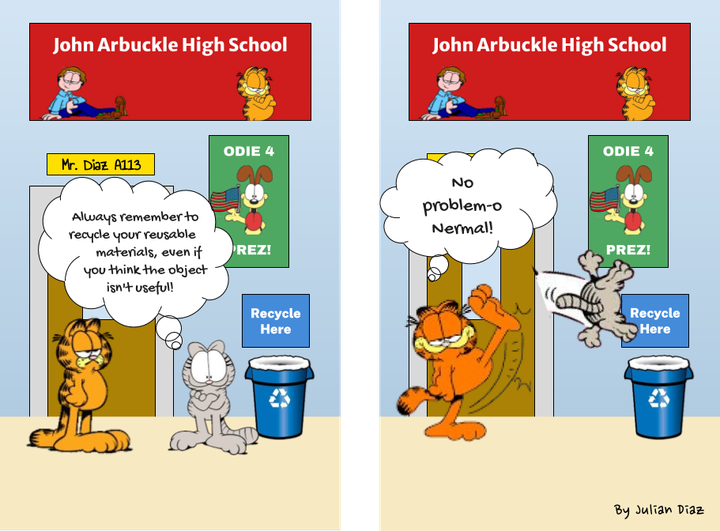MSMHS Has New Phone Rules. Do They Work?
Seniors Loralei Bishop and Theo McGee debate the new MSMHS phone policies/.

Loralei: Hi, I’m Loralei, and I'm a senior.
Theo: Hi, I'm Theo, and I'm a senior here at MSMHS. Today, Loralei and I are debating what phones are really used for and what school policies should exist around them. My position is that phones should not be regulated as heavily as they are right now, while Loralei believes that…
Loralei: I believe that the class disruption that comes with phones makes it so that it's necessary to regulate them heavily.
Theo: However, in the real world they won't be regulated. So what’s the point of putting regulation here that gets rid of the habit-building that is necessary for students to really thrive in the real world?
Loralei: There isn't really the opportunity to give students the time to build the habits if there is no regulation — you are never going to choose to not be on your phone. If there is no regulation, then there is no reason to think that these habits will be formed.
Theo: Okay, so I recognize that — it is absolutely addictive and people want to be on their phones regularly. However, do you think that they need to be entirely banned? Do you think there is some sort of happy medium that could be reached where students are still able to use them and not afraid to take them out?
Loralei: I think there probably is, but I think leaning towards stricter regulation is better. Before the phone policy, it was so much of an issue that, in some of my classes, the teacher would spend more time correcting people to put their phones away than actually teaching.
Theo: Would that not have been an issue with the teacher individually, not the policy? The policy last year was that, after one warning, the phone would get taken down to the office. So, wouldn't that be a teacher issue and not necessarily an overall policy issue?
Loralei: But what would be the issue with the teacher then? Would it be that they weren't enforcing the old policy?
Theo: Yeah, they weren't fully enforcing the policy, which is what created the issue that you just described. Instead of changing the policy, it should have been changed the level of enforcement
Loralei: I feel like the issue with the policy last year is that it was wishy-washy; students were saying ‘oh, this teacher doesn't follow it’ or ‘this teacher does’ so when the teachers would actually try to enforce it, it was really difficult to get kids to actually follow it. With a stricter policy, they just take your phone and bring it to the office.
Theo: Okay, I recognize that, but once one's phone gets taken to the office as you said, doesn't that put the student in a more vulnerable state almost? Because they don't have access to the wider world?
So, theoretically, if there was an emergency in the school, wouldn't they be more vulnerable because they don't have the ability to communicate to their parents and make sure that other people they care about are okay in the building?
Loralei: So you're saying if there was an emergency in the school right? Like a lockdown or something?
Theo: I was thinking about something like a fire; with phones gone, their parents have no idea how they are. Wouldn't that cause additional stress because they don't have that device?
Loralei: That’s a valid point, but I'm pretty sure you’re not supposed to contact parents about that because there's issues with unnecessarily causing panic with parents in case of a false alarm. In those situations, the school will contact parents.
Theo: I recognize that. However, in the heat of the situation, would it not be one's first reaction to tell people that they are okay so that they aren't worried?
Loralei: Yeah, but you're not supposed to like…
Theo: Okay, okay, I see what you're saying, so it helps enforce the policy. Ok, so take this situation: you’re working on a group project and a partner is stuck at home with, say, Covid — they’re asymptomatic and able to work, but just not able to come to school. In this situation, you can't communicate with them, hampering both your learning and their learning.
Loralei: So, you’re saying that if they had their phone, all of the group members could communicate?
Theo: Exactly. And I recognize that you could communicate via email, but that's just not the method that students are used to and it would be significantly slower.
Loralei: I think it’s difficult to make exceptions for situations like these — there's no way to know if students are going to be doing other things while on their phones. I mean, I've seen students watching Netflix in the middle of class .
Theo: Oh yeah.
Loralei: I feel that it's difficult to make exceptions without the entire policy crumbling.
Theo: I'm not saying that we should make exceptions, I'm just saying that the phone policy should be looser. It really just falls back on the student to produce quality work if it is a work day, right?
Loralei: So, are you saying that there are special situations where students need their phones?
Theo: My ideal policy is that you’re not told to put your phone in your pocket at the beginning of every class. Instead. if a teacher sees you using it, you get your first warning to put it away, like last year. After that first warning, it’s put in the pocket; if you give the teacher any sort of flack, then it goes down to the office.
Loralei: So, essentially you essentially want to bring back the former policy, right?
Theo: Yeah, because I think that if that policy is enforced as it was designed, it would be a happy medium that satisfies both your concerns and my concerns.
Loralei: That’s a valid point, but like I feel like there have been certain situations where it seems like the teacher felt out of control — as it is now, the level of strictness makes it feel like you are trying to fight against administration, which can instill a negative view over the school.
Theo: Absolutely, I would agree that hating the policy can impact the school, but I think that still exists now with the policy. I think the key is having a policy that enough people can agree on, and I think that rolling back the strictness a little bit is the way to do that, while keeping the same enforcement level.
Loralei: I think if we made students more involved — for example, making the pockets optional to use — it might help with support of the rules.
Theo: Absolutely, I think that's a great idea having the option there.
Loralei: Then it helps to engage students, — with the dress code changes, students were involved, so people follow it.





